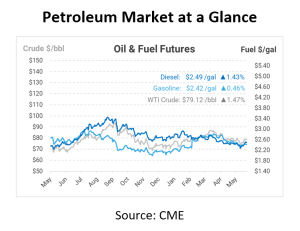
Lubricants: A Look at Viscosity Ratings
As the owner or operator of a bustling truck fleet, you understand the critical importance of keeping your vehicles on the road and delivering goods efficiently and reliably. The lubricant you choose (viscosity) for your engines plays a crucial role in your fleet’s performance. Selecting the right oil ensures your vehicles run smoothly, maximizing efficiency and minimizing downtime.
A key aspect to consider when choosing a lubricant is its viscosity. It directly influences how the lubricant performs under various operating conditions. It affects the lubricant’s ability to reduce friction, prevent wear and tear, and ultimately enhance the performance and longevity of your engine parts. So, what exactly is viscosity, and why is it important?
Viscosity Explained
In simple terms, viscosity refers to a fluid’s resistance to flow. Think of honey and water. Honey, being more viscous, flows slowly compared to water. In the context of lubricants, it determines how well the oil can lubricate and protect the engine under different temperatures and conditions: the higher the temperature, the lower the viscosity.
Thin oils have a lower viscosity, allowing them to flow more easily at low temperatures compared to thicker oils, which have a higher viscosity. Thin oils minimize friction in engines and facilitate quick starts in cold weather. In contrast, thick oils are more effective at maintaining film strength and oil pressure under high temperatures and heavy loads.
Ratings
Lubricants are classified by their viscosity ratings. For instance, a truck engine oil might be rated as 10W-30 or 15W40. The “W” indicates the oil’s viscosity at low temperatures (W stands for winter or the viscosity at a temperature of 0F), ensuring the engine can start easily in cold weather. The upper number denotes the oil’s viscosity at high operating temperatures (200F or more), providing adequate protection and lubrication when the engine is hot.
The general recommendation for truck owners is to use the thinner 10W-30 grade oil year-round if not operating under maximum load in very hot weather. However, if they are hauling heavy loads or driving in adverse conditions, such as mountainous terrain with desert-like temperatures, the 15W-40 oil would be more suitable. This is because, despite truck diesel having a large, thermostatically controlled oil cooler, the oil’s temperature will still increase under extreme weather and heavy load conditions.
CK-4 and FA-4 Oils and Late-Model Engines
There’s another aspect worth noting. The latest approved heavy-duty diesel engine oils are designated CK-4 and FA-4. CK-4 oils are suitable for all engines, providing protection for older models as well. FA-4 oils, while categorized under standard viscosity ranges, are actually slightly thinner. These lower-viscosity FA-4 oils reduce friction but are only compatible with newer engines, specifically those from 2017 onward. Even if the upper viscosity rating is 30, the actual viscosity is slightly lower. This difference in measurement is crucial for protecting the engine’s tight-fitting parts, such as pistons and rings.
Impact on Performance
The viscosity of a lubricant directly affects an engine’s efficiency and durability. Here’s how:
- Start-Up Protection: At low temperatures, a lower viscosity oil (like 5W or 10W) flows more efficiently, reducing friction and wear during engine start-up. This is crucial because most engine wear happens during this phase.
- Operating Temperature Performance: Higher viscosity oils (like 30 or 40) maintain their thickness and protective qualities at high temperatures, ensuring the engine components are adequately lubricated even under intense heat and stress.
- Fuel Efficiency: The right viscosity can also enhance fuel efficiency. Too thick an oil can cause the engine to work harder, consuming more fuel, while too thin an oil might not provide sufficient protection, leading to increased wear and tear.
Choosing the Right Lubricant
Selecting the right lubricant involves understanding your vehicle’s requirements and the environmental conditions in which it operates. Consulting with experts, such as those at Mansfield Services Partners (MSP), can provide valuable insights.
Mansfield Service Partners specializes in distributing high-quality lubricants and fluids that have a proven track record of enhancing equipment reliability and performance. As a Shell Prestige Distributor, we offer not only the industry’s leading brands but also our own proprietary line of products. Contact us today to explore how we can empower your business and help you achieve your goals.


